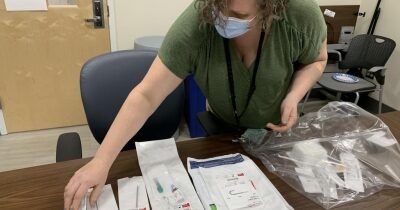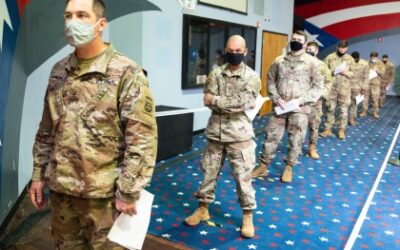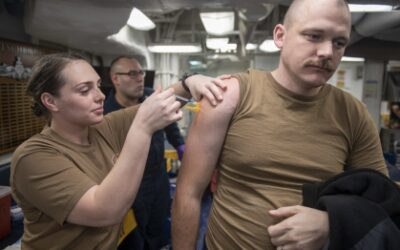Military servicemembers and veterans are at high risk for head injury compared with civilians. More than 369,000 U.S. veterans have at least one mild traumatic brain injury, and many report the onset or worsening of headache within three months of their injury.
GAO Report Spotlights Medical Supply Issues at VA Healthcare Facilities
Each report the Government Accountability Office (GAO) submits to VA detailing weaknesses in the department comes attached with recommendations for solving the problems.
Pain Associated With Gray-Matter Volume Differences in Gulf War Veterans
Gulf War veterans with chronic pain display changes in the volume of key areas of the brain, a finding that could explain why these veterans experience prolonged pain, according to a new study.
Despite Allergic-Type Reactions, Military Study Found Many Patients Can Tolerate Second Dose of COVID-19 mRNA Vaccine
Although serious allergic reactions to mRNA vaccines are extremely rare, fear of them has driven hesitancy among some potential recipients. That especially has been the case when an adverse effect occurred after the first dose.
VA Further Postpones Electronic Health Record Rollout to New Facilities
VA has postponed the rollout of its new electronic health record (EHR) system to new facilities, including to Boise, ID, where it had been scheduled to go live last month.
Ho Seeks to Reduce Barriers to Care—Inside and Outside VA
Michael Ho, MD, PhD, a staff cardiologist at VA Eastern Colorado Health Care, has spent much of his professional career studying how veterans access VA and the barriers that might stand in their way.
MHS Researchers Found Current Antibiotic Dosing Guidelines Adequate for Critically Ill Patients With Trauma, Burn
Critical illness caused by burn and sepsis doesn’t alter how the body processes piperacillin and tazobactam (pip-tazo), an antibiotic and beta-lactamase inhibitor drug combination
Cost of VA-Reimbursed Community Care Is Rising Dramatically
Between FY 2017 and FY 2021, VA spending on community care rose from $10.1 billion to $21.8 billion–a 116% increase that does not factor in the costs of administering the program. At the same time, VA spending on healthcare in its own facilities grew 32%.
Chronic Traumatic Encephalopathy Is Uncommon in Brains of Military Personnel
Military personnel exposed to attacks with high explosives frequently experience neuropsychiatric symptoms, including cognitive dysfunction, behavioral changes, mood disturbances and suicidality.
Severe Staffing Shortages Are Again Increasing at VA Medical Facilities
After years of improvements, severe staffing shortages are back on the rise at VA. According to a VA Office of the Inspector General (OIG) report released last month, fiscal year 2022 put an end to a three-year staffing improvement
We will never have true civilization until we have learned to recognize the rights of others
It has been difficult to observe the recent overturn of Roe v. Wade, 410 US 113 (1973), which held that the U.S. Constitution provided citizens the right to choose an abortion. There are few topics as religiously and politically charged as abortion. It is the proverbial “third rail” of dinner conversation and editorialists. It would be safest for both my U.S. Medicine editors and me to avoid this topic at all costs, lest we offend a large portion of our readership.
Low VHA COVID-19 Booster Rates Leave Veterans Vulnerable to Severe Cases
President Joe Biden, despite being 79 years old, had a mild case of COVID-19. The primary explanation for why he escaped severe symptoms is that he was not only vaccinated, but double-boosted.
SBRT Linked to Less Toxicity Than Limited Resection But More Fatigue
NEW YORK – For the estimated one-fourth of early-stage lung cancer patients not medically fit for lobectomy, limited resection and stereotactic body radiation therapy (SBRT) are seen as alternative treatments. “Given the equipoise on the effectiveness of the two...
Should USPSTF Lung Cancer Screening Recommendations Be Expanded?
WASHINGTON, DC – In 2021, the U.S. Preventive Services Task Force recommended annual lung cancer screening with low-dose computed tomography (LDCT) for adults aged 50 to 80 years who have a 20-pack-year smoking history and currently smoke or have quit within the past...
Biomarkers Can Stratify outcomes in Some ICI-Treated NSCLC Patients
NEW HAVEN, CT – In non-small cell lung cancer (NSCLC), there are limited predictive biomarkers for anticancer immunotherapy. Proposed as candidate biomarkers for immune checkpoint inhibitors (ICI) in patients with advanced NSCLC are tumor-infiltrating lymphocytes...
SMASH2 Scoring System Better Predicts Atrial Fibrillation
CHICAGO — Atrial fibrillation-associated morbidity and mortality are on the increase, and a new study pointed out the critical need for improved surveillance and prevention strategies to reduce the condition which can lead to strokes. The report in The Journal...
Acute Heart Failure Patients Benefitted from Use of SGLT2 Inhibitors
KANSAS CITY, MO – While sodium-glucose cotransporter 2 inhibitors (SGLT2), initially used to treat type 2 diabetes, have been shown to improve health status in chronic heart failure, their effect in acute heart failure has not been as clear, according to a new study....
Causes of Hypertrophic Cardiomyopathy Extend Beyond Genetic Factors
BOSTON — For three decades, hypertrophic cardiomyopathy has basically been considered to be a genetic disease. The cause was believed to be variants in individual genes encoding cardiac sarcomere proteins. But that is changing, however, according to a review published...
New Legislation Gives VA Inspector General More Investigative Clout
Two pieces of new legislation would provide VA’s Office of the Inspector General with greater investigative power and employees with a better understanding of how OIG works and what their responsibilities are when asked for assistance by investigators.
VA Liquid Biopsy Study Aims to Screen 10,000 Veterans for Cancer
Veterans comprise nearly one-third of the participants in a major study evaluating a multi-cancer, early-detection blood test.
VA Makes Efforts to Respond to Healthcare Workers’ High Levels of Stress
As VA employees are reporting increasing levels of burnout, and the department is facing its highest turnover rate in decades, VA has tried to put systems in place to support staff mental and emotional health.
Concerns Raised Again About VA’s Widespread Cybersecurity Deficits
For the past four years, the annual Federal Information Security and Modernization Act (FISMA) audit has warned that the VA has lingering deficiencies across a wide range of cybersecurity areas, from agency wide security management programs to incident reporting and identity management.
Telemedicine Effective for Parenteral Chemotherapy Administration at VAMC
With patients in rural Nebraska who have trouble accessing the primary campus in Omaha, the VA Affairs Nebraska Western Iowa Health Care System (VA-NWIHCS) is using teleoncology and remote chemotherapy services to expand care to those veterans.
VA Tries to Address Societal Factors Leading to Veteran Suicides
For decades, VA’s response to preventing veteran suicide has been focused almost exclusively on healthcare, specifically mental healthcare.
Medications Might Skew Testing in One-Third of Older Vets With Hypothyroidism
Clinicians can find it difficult to manage hypothyroidism in older veterans, who tend to have a greater likelihood of adverse effects because of comorbidities, polypharmacy or both.
Senate Changes Spread Out PACT Act Implementation Over Years
When Honoring Our Promise to Address Comprehensive Toxics (PACT) Act passed the House in March, it was expected to be a very hard sell in the Senate.
COVID-19 Pandemic Reduced Prostate Cancer Biopsies Among VA Patients
The COVID-19 pandemic had a negative effect on prostate cancer screening and diagnosis rates among veterans, but no racial discrepancies were identified, according to a new study.
Veterans With CLL/SLL Have Suboptimal Adherence to New Therapies
Suboptimal adherence to new therapies for chronic lymphocytic leukemia (CLL)/small lymphocytic leukemia (SLL), as well as related costs and healthcare resource use, demonstrate unmet needs in real-world treatment of the blood cancers, according to a new review.
Military/VA Search for New, Nonopioid Methods to Combat Chronic Pain
The last decade has seen health systems the world over shift away from using opioids for pain management. First there was the too-slow understanding that opioids are addictive and were being massively over-prescribed.
Depression Can Affect Dual-Task Walking in Multiple Sclerosis
Dual-task walking (DTW) can be a complex process for multiple sclerosis patients. A new study looks at what functions it requires.







